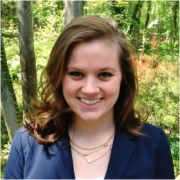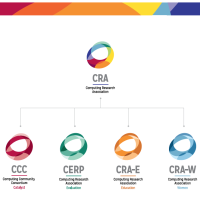Announcements
CRA Welcomes Helen Vasaly
 Computing Research Association is pleased to announce the hire of Helen Vasaly as a Program Associate for the Computing Community Consortium. In her current role, Helen interacts with members of the research community and policy makers to organize meetings, workshops, and outreach activities. Previously, she was a Science Education Analyst at the National Science Foundation working on promoting excellence in undergraduate STEM education for the Education and Human Resources Directorate. Helen organized and participated in a number of outreach events and conferences for many programs including the Advanced Technological Education (ATE) Program,whose goal is to increase the education of technicians for the high-technology fields that drive our nation’s economy.
Computing Research Association is pleased to announce the hire of Helen Vasaly as a Program Associate for the Computing Community Consortium. In her current role, Helen interacts with members of the research community and policy makers to organize meetings, workshops, and outreach activities. Previously, she was a Science Education Analyst at the National Science Foundation working on promoting excellence in undergraduate STEM education for the Education and Human Resources Directorate. Helen organized and participated in a number of outreach events and conferences for many programs including the Advanced Technological Education (ATE) Program,whose goal is to increase the education of technicians for the high-technology fields that drive our nation’s economy.
She holds a bachelor’s of science in biology as well as a master’s of science in ecology and evolutionary biology from the University of Virginia.
CRA and CCC are excited to have Helen as the newest addition to our team!
Stu Zweben and Betsy Bizot Receive Grant from Sloan Foundation
Stu Zweben (Professor Emeritus, The Ohio State University, and Chair of the CRA Survey Committee) and Betsy Bizot (CRA Director of Statistics and Evaluation) have been awarded a grant from the Alfred P. Sloan Foundation for “An In-Depth Examination of Data and Trends Regarding Women in Computing.” Published information on the status of women in computing tends to be either highly aggregated (e.g. nationwide percentages such as those in the Taulbee report each year or in NCWIT’s “By the Numbers” summary) or very detailed, focusing on a single academic level, a subset of women or institutions, or results of a particular intervention. The purpose of this project is to systematically examine 20 years of national data on women’s representation at multiple points from first-year college students through Ph.D. recipients and academic faculty, in search of important differences that may be obscured by high-level aggregation and important commonalities that may be missed by more narrowly focused studies. The project will use data from the Taulbee Survey, the ACM survey of Non-Doctoral-Granting Departments, IPEDS, the NSF Survey of Earned Doctorates, and the Higher Education Research Institute (HERI: The Freshman Survey), disaggregating as much as possible by factors such as type of institution or program, ethnicity, citizenship, and field of computing. The grant is one of five awarded by the Foundation in a program studying women in computing and IT.









